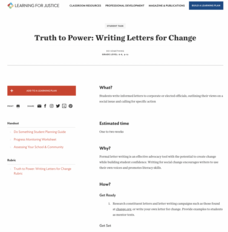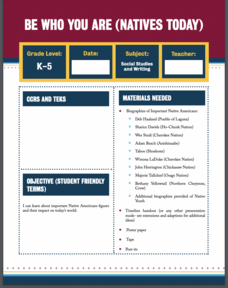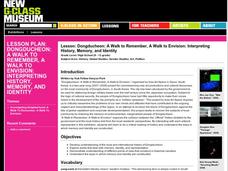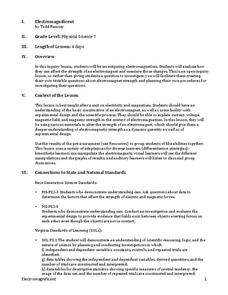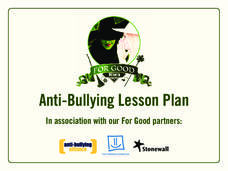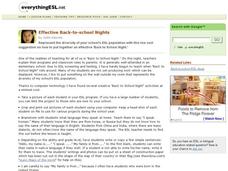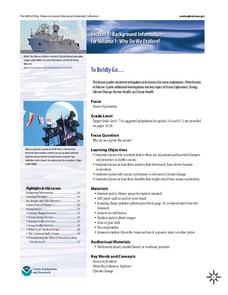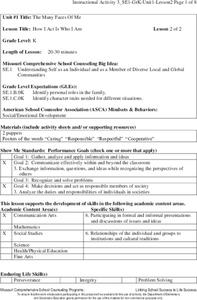Teaching Tolerance
Act Up! Drama for Justice
A lesson turns young historians into playwrights to understand and speak out against social injustice. Pupils work individually or in groups to write and perform monologues that deliver personal messages on social justice. Writers then...
Teaching Tolerance
Truth to Power: Writing Letters for Change
Can letter writing really create social change? Pupils create and mail formal letters addressing a specific organization to promote social change they wish to see. Class members reflect on the process and responses they received in small...
Curated OER
Be Who Your Are
An engaging video begins a lesson all about the representation of Native Americans in all types of careers. Following a discussion about the video, scholars participate in a gallery walk showcasing various Native American figures. Pupils...
Curated OER
Cross-Cultural Dialogue Lesson
Use the Peace Corps to explore a different place and different perspectives. Your class reads the personal narrative "Cross-Cultural Dialogue" by Roz Wollmering, completing an attached story frame sheet in preparation for a class...
Curated OER
Lesson: Dongducheon: A Walk to Remember, A Walk to Envision: Interpreting History, Memory, and Identity
Cultural discourse can start through a variety of venues. Learners begin to think about how our minds, memories, and identities shape our attitudes toward culture and history. They analyze seven pieces from the Dongducheon art exhibit...
STEM for Teachers
Electromagnificent
This physics pun really hertz, but this STEM lesson plan can help. The inquiry-based activity has young scientists create a testable question about electromagnetic strength; plan and implement their own experiments; and record and...
Macmillan Education
What Do You See?
Encourage learners to develop greater self-awareness and an understanding of perception versus reality. Here you'll find a life skills lesson that includes worksheets, discussion, and brainstorming activities on the topic of how we see...
Museum of Disability
Don't Laugh at Me
You can prevent bullying in your classroom by addressing kindness, empathy, and acceptance with your littlest learners early on. After reading Don't Laugh at Me by Steve Seskin and Allen Shamblin, kids discuss the ways that words...
Stanford University
What Is History?
Five important tenets of any social studies class are available for young historians with a poster that defines history as an account of the past. It encourages learners to question reliability of an author's perspective, as well as...
Anti-Bullying Alliance
Anti-Bullying Lesson Plan
Wicked is not just a Tony Award winning broadway musical. It also makes for a strong base to teach character education, specifically anti-bullying. Scholars listen, discuss, role play, and show what they know through a group...
Curated OER
Effective Back-to-School Nights
Here is an engaging and creative project to do with your ESL learners in preparation for back to school night. A digital camera is used to photograph each pupil, and everyone completes a short writing assignment that goes along with...
Facing History and Ourselves
The Challenge of Confirmation Bias
Confirmation bias makes it difficult to overcome our preconceived notions of others. That's the big idea in a lesson that teaches learners strategies to recognize and question their biases.
Earth Day Network
Staying Green While Being Clean
Clean up the environment with a lesson that focuses on replacing hazardous cleaning supplies with green, environmentally-friendly products. Using a dirty patch of surface as a control area, kids clean other parts of various surfaces...
NOAA
To Boldly Go...
When we think of ocean exploration, many of us have visions of sunken pirate ships full of treasure or mysterious creatures of the deep. What really motivates deep-sea investigation? The first in a series of diverse six-part lessons...
Teaching Tolerance
Reflection: What’s Your FRAME?
Encourage your class to recognize the diversity in the beliefs and backgrounds of their peers. Learners use the acronym FRAME to consider culture, background, and life experiences.
EngageNY
End of Unit Assessment: Perspectives on Natural Disasters
Caption this! Scholars complete the end of unit assessment by rereading In the Middle of the
Storm. Learners answer written response questions about the text, and then create drawings to accompany their work. To finish, they caption...
Curated OER
Telecollaboration Lesson
Sixth graders explore the Caribbean sea and the Arctic ocean. They become familiar with the living conditions of others. Students investigate the geographic location of each area. They become familiar with important events that helped...
Missouri Department of Elementary
Happy, Sad, Scared and Mad: All Belong To Me
"What are feelings?" and "Why are feelings important to understand?" are the essential questions of a instructional activity that boosts self-awareness. Scholars discuss the four basic emotions—happy, sad, scared, and...
NOAA
Vertebrates II
Mammals of the ocean unite! Or not. The 20th installment of a 23-part NOAA Enrichment in Marine sciences and Oceanography (NEMO) program investigates how warm-blooded marine mammals survive in water. In the class activity, learners use...
Curated OER
Multiple Perspectives: Newspaper Stories and Editorials
Newspapers are the perfect medium through which to explore different perspectives in informational text. After researching the fur trade and resultant colonization, groups write a newspaper, including an editorial page, selecting one of...
Teaching Tolerance
The War on Drugs—Mechanisms and Effects
The war on drugs doesn't have definite results. An interesting lesson examines the social, political, and economic effect of the war on drugs. Academics learn how the war on drugs has led to mass incarcerations and negatively affected...
Teaching Tolerance
Parallels Between Mass Incarceration and Jim Crow
Is history repeating itself? A riveting lesson examines the parallels between mass incarceration in the U.S. and the Jim Crow Laws of the past. Academics review Jim Crow Laws and compare them to mass incarcerations of African Americans....
Missouri Department of Elementary
How I Act Is Who I Am
A lesson centers itself around the topic of family roles. A whole-class discussion uses puppets and posters to go in-depth into the following character traits; caring, responsibility, respect, and cooperation. The discussion closes with...
Curated OER
Finding Meaning in the Badge
Children who are three to five years old study two rank badges from the Qing dynasty to develop an understanding of social rank, language skills, and symbolism. The lesson is discussion-based and requires learners to compare and contrast...

